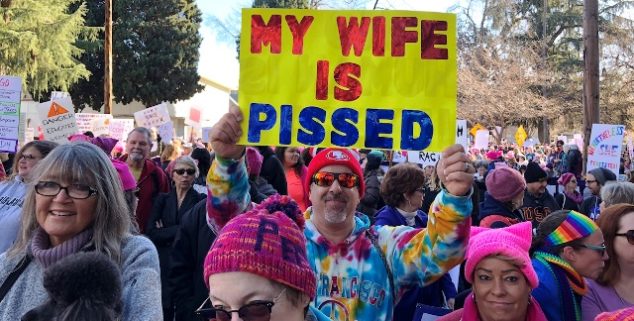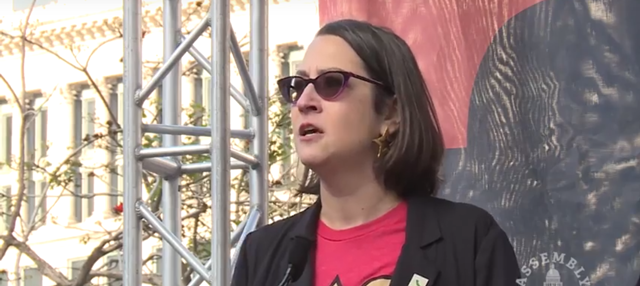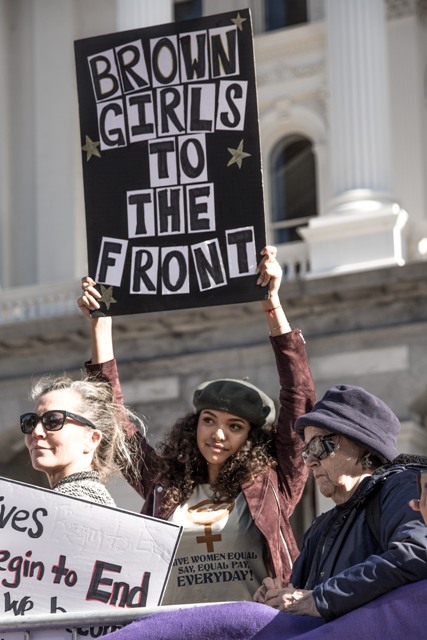News
Laura Friedman: First-term lawmaker in key Capitol role
 A dermonstrator at a Sacramento rally against sexual misconduct. (Photo: Tim Foster/Capitol Weekly)
A dermonstrator at a Sacramento rally against sexual misconduct. (Photo: Tim Foster/Capitol Weekly)Assemblywoman Laura Friedman, a first-term lawmaker, is among the most prominent figures in the California Capitol working to combat sexual harassment.
Not only has she become the Legislature’s de facto point person on sexual misconduct, but she’s also responsible for reshaping the current harassment-reporting process that many say has failed victims.
Friedman says her path to the prominent role was coincidental.
A Glendale Democrat, she was one of more than 140 women who in October signed a letter decrying a culture of harassment at the Capitol.
At a recent taping of Capitol Weekly’s Politics on Tap show, Friedman recalled waking up in the middle of the night several days after signing the letter and remembering she had been appointed months ago to lead a review of the Assembly’s rules against harassment. Laura Friedman at a Los Angeles rally against sexual misconduct. (Photo: Frame capture, YouTube)
Laura Friedman at a Los Angeles rally against sexual misconduct. (Photo: Frame capture, YouTube)
Assembly Speaker Anthony Rendon had convened a subcommittee in June to update the Assembly’s policies, which were more than a decade old. Rendon appointed Friedman to lead the group months before a global movement ignited in response to widespread sexual harassment in powerful institutions.
“I’m a total accidental part of this, in a way,” Friedman said.
The group of lawmakers she leads, which has since expanded to include senators, is tasked with rewriting the Legislature’s rules on sexual harassment.
Rendon, a Lakewood Democrat, says Friedman has turned out to be a good choice to lead the group even as its mission changed.
He describes her as a thoughtful and capable lawmaker. When he appointed her to lead the subcommittee, she sought assurances she would have the authority to make substantive changes.
“I knew that she would take a deep dive in order to address these issues,” Rendon said. “Ms. Friedman said that her aim was to come out with something that would make California a model.”
Friedman has convened the group three times, once before it morphed to include the Senate and twice after. It has heard more than seven hours of testimony from lawmakers, experts, advocates and women who have reported harassment.
She said she intends for the group to meet two or three more times before drafting the new policies. She anticipates the subcommittee will complete its work in the spring.
When asked for comment on issues related to sexual misconduct at the Capitol, Rendon’s office frequently defers to Friedman. Rendon said he wants to let her lead the effort and doesn’t intend to tell her how she should change the policies.
The new rules Friedman helps craft could be in place for a decade or more. There’s pressure right now to act swiftly, but lawmakers need to carefully consider any new laws to combat harassment, Friedman said. She says she feels a duty to the women who have come forward.

Left: Demonstrators in Capitol Park protest sexual misconduct. (Photo: Corben Wilson)
“If we pass bills that give them empty promises or pass bills that are counterproductive, then we will have failed,” she told Capitol Weekly in a recent interview. “So it’s very important that we take the time to get this policy right.”
The Legislature’s efforts to reform its reporting process have drawn flak for their slow start.
For months, the Assembly and the Senate were criticized for working independently on the issue. Supporters called for the two chambers to collaborate to make the process less confusing for those reporting harassment. The two houses finally announced the joint subcommittee chaired by Friedman last month.
The first hearing Friedman led revealed widespread confusion within the Capitol community about misconduct policies and investigations. Lawmakers, staffers and others spoke about their experiences with the process and their concerns about its efficacy.
Speakers described the process as opaque and lacking clear guidelines for when complaints are deemed serious enough to merit investigations. Friedman at one point remarked that she wondered if the Legislature could adequately police misconduct by its own members.
“She asks very thoughtful questions and certainly has immersed herself in understanding the subject matter,” said Samantha Corbin, executive director of We Said Enough, a group pushing for the Capitol to crack down on harassment. “There’s definitely been some insightful information that they’ve gotten [but] personally, I’d like to see the conversation move more rapidly toward solutions.”
Corbin said she’s concerned the subcommittee isn’t moving swiftly enough to ensure current investigations won’t succumb to the same problems that plagued prior inquiries.
Ten investigations are underway in the Assembly, Assembly Chief Administrative Officer Debra Gravert said earlier. On the Senate side, six investigations are underway as of last month, according to the Senate leader’s office. Both houses have hired outside law firms to conduct the investigations and report back to the Legislature.
Want to see more stories like this? Sign up for The Roundup, the free daily newsletter about California politics from the editors of Capitol Weekly. Stay up to date on the news you need to know.
Sign up below, then look for a confirmation email in your inbox.

Leave a Reply